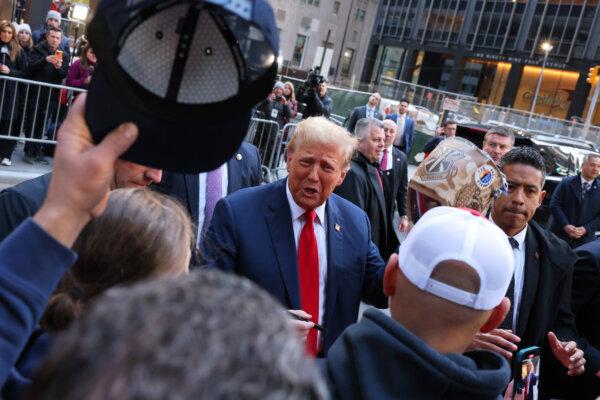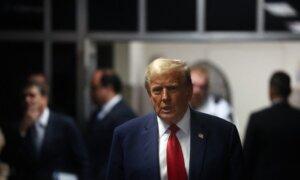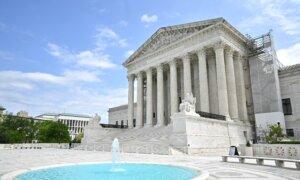His comment was made as U.S. Supreme Court heard arguments in former President Trump’s immunity case.
U.S. Supreme Court Justice Samuel Alito on Thursday questioned whether prosecuting former presidents may undermine the county’s governance during a hearing on former President Donald Trump’s presidential immunity case.
President Trump’s lawyers have argued that former presidents are entitled to absolute immunity for their official acts. Otherwise, they say, politically motivated prosecutions of former occupants of the Oval Office would become routine and presidents couldn’t function as the commander-in-chief if they had to worry about criminal charges.
“I’m sure you would agree with me that a stable, democratic society requires that a candidate who loses an election, even a close one, even a hotly contested one, leave office peacefully, if that candidate is the incumbent,” Justice Alito asked Michael Dreeben, an attorney for special counsel Jack Smith’s team, which is prosecuting the former president in two separate cases.
“Of course,” Mr. Dreeben replied.
The Bush-appointed justice then pondered that “if an incumbent who loses a very close, hotly contested election, knows that a real possibility after leaving office is not that the president is going to be able to go off into a peaceful retirement, but that the president may be criminally prosecuted by a bitter political opponent, will that not lead us into a cycle that destabilizes the functioning of our country as a democracy?”
Justice Alito noted that in other countries, “we have seen this process” where the loser of an election “gets thrown in jail.”
In response, Mr. Dreeben said that he believes there are “lawful mechanisms to contest the results in an election and outside the record” but asserted that President Trump and others “filed dozens of electoral challenges and my understanding is they lost all but one” in the courts after the 2020 election.
“There was an appropriate way to challenge things through the courts with evidence, if you lose, if you accept the results,” he added. “That has been the nation’s experience. I think the court is well familiar with that.”
But Justice Alito pushed back on those claims about there being enough legal safeguards to handle prosecutors who are acting in a politicized manner. He and Mr. Smith’s team have noted that prosecutors must go to grand juries to get an indictment as one check against politically motivated prosecutions.
Justice Alito responded by saying that prosecutors could convince a grand jury to “indict a ham sandwich.” Grand juries have long been criticized by some lawyers and judges as little more than a rubber stamp for prosecutors.
In the hearing, the justice also asked whether former President Franklin D. Roosevelt could be indicted for the U.S. government’s internment of thousands of Japanese-Americans in camps during World War II. Mr. Dreeben responded in the affirmative.
Lower courts have rejected President Trump’s lawyers’ arguments, including a panel of the Washington appeals court earlier this year. The special counsel has argued that the Founding Fathers never intended for presidents to be above prosecution, while they have argued that some of President Trump’s activity after the 2020 election was not part of his official duties as president.
President Trump and his lawyers have said that presidents should be declared immune because otherwise, political opponents would target them with spurious criminal charges once they leave office. If the Supreme Court doesn’t grant the former president immunity, they argued, other presidents will be prosecuted in the future.
They’ve also argued that the former president was carrying out his presidential duties when he was seeking to expose election fraud during the 2020 election.
“If you don’t have immunity you’re not going to do anything. You’re going to become a ceremonial president,” President Trump told reporters in New York this week, referring to the Supreme Court case. “You’re not going to be taking any of the risks, both good and bad.”

Chief Justice John Roberts was among at least five members of the court who did not appear to embrace the claim of absolute immunity that would stop the prosecution of President Trump on charges he allegedly conspired to overturn his 2020 election loss. However, Justice Roberts also was among several justices who suggested that the case might have to be sent back to lower courts before any trial could begin.
The chief justice also indicated he was unhappy with the reasoning adopted by the Washington appeals court that issued the ruling against President Trump.
“You know how easy it is in many cases for a prosecutor to get a grand jury to bring an indictment and reliance on the good faith of the prosecutor may not be enough in the some cases,” Justice Roberts said during the hearing.
The Associated Press contributed to this report.
Original News Source Link – Epoch Times
Running For Office? Conservative Campaign Consulting – Election Day Strategies!


